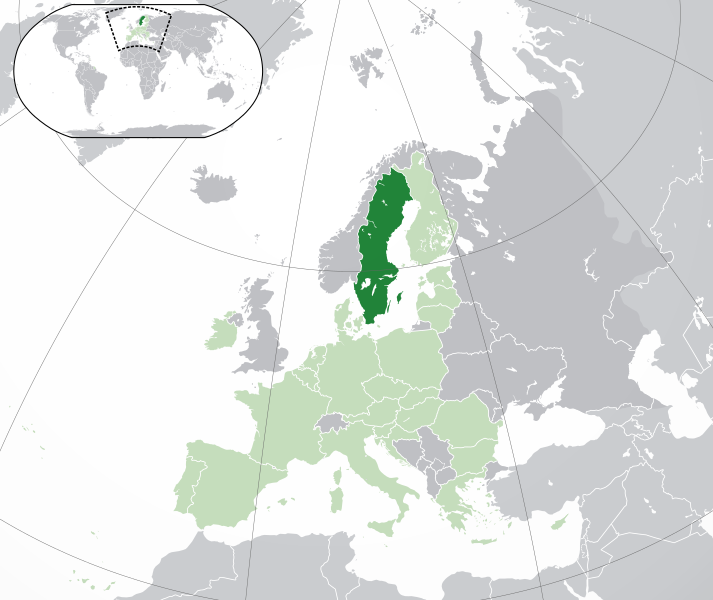 Sweden (pronounced /ˈswiːdən/ (help·info) SWEE-dən, Swedish: Sverige pronounced [ˈsvæːrijə]), officially the Kingdom of Sweden (Swedish: Konungariket Sverige), is a Nordic country on the Scandinavian Peninsula in Northern Europe. Sweden has land borders with Norway to the west and Finland to the northeast, and water borders with Denmark, Germany and Poland to the south, and Estonia, Latvia, Lithuania and Russia to the east. Sweden is also connected to Denmark by a bridge-tunnel across the Öresund.
Sweden (pronounced /ˈswiːdən/ (help·info) SWEE-dən, Swedish: Sverige pronounced [ˈsvæːrijə]), officially the Kingdom of Sweden (Swedish: Konungariket Sverige), is a Nordic country on the Scandinavian Peninsula in Northern Europe. Sweden has land borders with Norway to the west and Finland to the northeast, and water borders with Denmark, Germany and Poland to the south, and Estonia, Latvia, Lithuania and Russia to the east. Sweden is also connected to Denmark by a bridge-tunnel across the Öresund.
At 450,295 square kilometres (173,860 sq mi), Sweden is the third largest country in the European Union by area, with a total population of about 9.4 million. Sweden has a low population density of 21 inhabitants per square kilometre (54 /sq mi) but a considerably higher density in the southern half of the country. About 85% of the population live in urban areas, and it is expected that these numbers will gradually rise as a part of the ongoing urbanization. Sweden’s capital is Stockholm, which is also the largest city in the country (population of 1.3 million in the urban area and with 2 million in the metropolitan area).
Sweden emerged as an independent and unified country during the Middle Ages. In the 17th century, the country expanded its territories to form the Swedish Empire. The empire grew to be one of the great powers of Europe in the 17th and early 18th century. Most of the conquered territories outside the Scandinavian Peninsula were lost during the 18th and 19th centuries. The eastern half of Sweden, present-day Finland, was lost to Russia in 1809. The last war in which Sweden was directly involved was in 1814, when Sweden by military means forced Norway into a personal union which lasted until 1905. Since then, Sweden has been at peace, adopting a non-aligned foreign policy in peacetime and neutrality in wartime.
Today, Sweden is a constitutional monarchy with a parliamentary democracy of government and a highly developed economy. It ranks first in the world in The Economist’s Democracy Index and seventh in the United Nations’ Human Development Index. Sweden has been a member of the European Union since 1 January 1995 and is a member of the OECD.

Notes from Wikipedia








